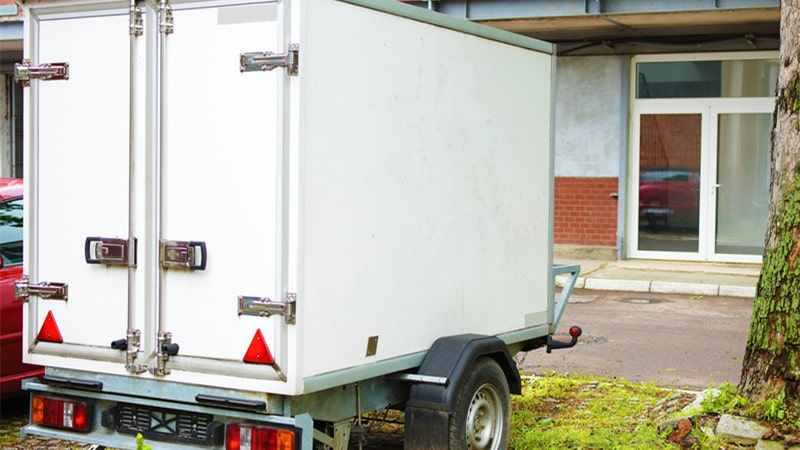Many businesses are embracing what fridge trailers have to offer. In particular, they’re choosing to hire this equipment and expand their storage without the huge purchase bill. But, you might be unsure about making this leap. This can be down to all of the myths you find on the internet. Today, we’re going to debunk them and bring you the truth about fridge trailers.
Myth 1: “Fridge Trailers are Only for Food”
There’s a pervasive belief that fridge trailers are exclusive to the food industry. In reality, these cool contraptions have a far-reaching portfolio. Beyond your favourite meals, fridge trailers cater to pharmaceuticals, flowers, and a myriad of other temperature-sensitive goods. The versatility of these trailers extends far beyond the grocery aisle.
Myth 2: “All Fridge Trailers are Created Equal”
Not all fridge trailers are cut from the same icy cloth. They come in various types, each designed with specialised features to meet specific needs. Whether you’re storing perishable goods or delicate flowers, choosing the right type makes all the difference in preserving the integrity of your cargo. For quality fridge trailers you can hire, check out Icecool Trailers.
Myth 3: “Fridge Trailers are Energy Hogs”
Contrary to the belief that all fridge trailers are energy vampires, modern technology has stepped in to offer solutions. Energy-efficient technologies, from improved insulation to smart temperature control systems, have transformed these trailers into eco-friendly and cost-effective assets. It’s time to dispel the myth of the power-hungry fridge trailer.
Myth 4: “Temperature Control is Set-and-Forget”
Setting the temperature and forgetting about it is a common misconception. The reality is far more nuanced. Continuous monitoring is crucial to ensuring your goods stay in optimal conditions. Modern fridge trailers come equipped with real-time tracking systems, allowing you to catch and address any deviations before they impact your goods.
Myth 5: “Fridge Trailers are High Maintenance”
The notion that fridge trailers are high maintenance can be a costly misunderstanding. With regular inspections and preventive maintenance practices, downtime and repair costs can be minimised. Investing in the care of your trailer ensures it operates smoothly, debunking the myth that it’s a constant drain on resources.
Myth 6: “Fridge Trailers are Environmentally Unfriendly”
Some believe that fridge trailers are significant contributors to environmental degradation. However, the industry has embraced eco-friendly features, from energy-efficient systems to sustainable materials. Fridge trailers are evolving to leave a smaller carbon footprint, debunking the myth that they are inherently environmentally unfriendly.
Myth 7: “Fridge Trailers are Cost-Prohibitive for Small Businesses”
The misconception that only large enterprises can afford fridge trailers overlooks the variety of options available. From renting to exploring cost-effective models, small businesses can benefit from the efficiency and reliability of fridge trailers without breaking the bank. It’s time to debunk the myth that these assets are exclusively for industry giants.
Myth 8: “Fridge Trailers Can Only Maintain Cold Temperatures”
The belief that fridge trailers are limited to cold storage is a frosty misconception. With advancements in technology, many trailers offer multi-temperature and climate-controlled capabilities. Whether it’s freezing or chilling, fridge trailers can adapt to the specific needs of diverse goods, debunking the myth of their one-dimensional nature.
Myth 9: “Fridge Trailers are Impervious to External Conditions”
While fridge trailers are designed to maintain optimal internal conditions, they’re not impervious to external factors. Proper insulation and safeguards against extreme weather conditions are crucial. It’s important to debunk the myth that these trailers are immune to the challenges posed by the elements.
Powering a Fridge Trailer: How Can It Be Done?
Most businesses love the sound of a fridge trailer. You can affordably increase your cold storage space and even use it at outdoor events. But, there’s one big question that’s on everyone’s mind. How do you power a fridge trailer? Of course, this equipment requires constant power to ensure that goods are kept at the necessary temperature. Typically, there are two ways that can be done successfully. This includes using the grid or a generator.
The Grid
The first and most popular option is to use the grid when you want to power up the fridge trailer. Typically, you’ll need to be within 20m of the power supply, and you can plug in the trailer using something like a 13 AMP 3-pin socket. It will be simple and reliable, especially if you’re at your business premises.
Note that many cold storage companies will install the fridge trailer for you. This includes connecting it to the grid to be ready to use. Do some investigation to ensure this is the case so that your additional cold storage is up and running efficiently. Often, you can position a fridge trailer indoors or outdoors, which can give you options on the power supply you want to utilise.
A Generator
Naturally, many businesses worry they can’t enjoy the benefits of a fridge trailer when they don’t have access to the grid. For example, if you’re working in a remote location and there’s no power supply around, you wonder if a fridge trailer is even possible. Well, the answer is yes. Instead of the grid, you can use a generator. This will still supply you with the power necessary for temperature control and consistency.
Therefore, know that your location is not going to be an obstacle to hiring a fridge trailer. It’s possible to use a power generator wherever you are, and this is a reliable option even for long events and special occasions. Most cold storage companies will offer this as a solution, providing you with all of the necessary cables and equipment. Just ensure you communicate your needs beforehand to get exactly what you want.
Conclusion
In wrapping up our journey through the chilly realm of fridge trailer myths, it’s evident that misinformation can melt away when faced with facts. Dispelling these myths is not just about setting the record straight; it’s about fostering a more informed and nuanced understanding of these indispensable transportation units.
So, the next time someone tries to freeze you with fridge trailer fiction, arm yourself with the truth and keep the logistics conversation thawed out.




